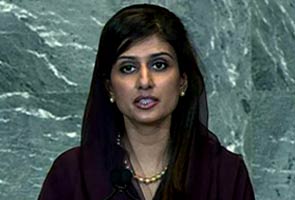United Nations: In the midst of tensions between the United States and Pakistan over the latter's spy agency, the Inter Services Intelligence or ISI's alleged link to terror groups, Pakistan's Foreign Minister Hina Rabbani Khar has said that the ISI has been at the forefront of operations against terrorist organisations like the Al Qaeda.
In her speech to the UN General Assembly, Ms Khar condemned the recent assassination of Afghanistan's former President Rabbani and said this was not a time for recrimination.
"Given the volatility of the situation, it is perhaps understandable that there is a high level of anxiety and emotions. But we must not lose sight of the goals. We must work closely and as responsible partners together in a cooperative manner and not rush to judgments or question each other's intentions," she said.
Ms Khar also said that India and Pakistan are engaged in a "substantive dialogue process" that Islamabad hopes will be "uninterrupted and uninterruptable" as it looks forward to resolve all outstanding issues like the Kashmir dispute.
"I am happy to note that both Pakistan and India are now engaged in a substantive dialogue process. A dialogue process that we in Pakistan hope will be uninterrupted and uninterruptable," Khar said in her address on behalf of Prime Minister Yousuf Raza Gilani.
"We look forward to resolving all outstanding issues, including the Jammu and Kashmir dispute, which is among the oldest on the agenda of the United Nations and the subject of several Security Council resolutions," she said.
Pakistan intends to make the engagement with India "fruitful and premise it on the promise of a mutually rewarding enterprise that would enable us to optimally avail the complementarities that exist", she said.
However, she made it clear that Pakistan wants the Kashmir issue resolved in accordance with the wishes of the Kashmiri people.
"A peaceful resolution that accords fully with the aspirations of the Kashmiris is a sine qua non for durable stability, as is the need for safeguarding of their fundamental human rights," she said.
"The reality of a nuclearised South Asia, imposes on both Pakistan and India, the onerous responsibility to work together for creating mutual confidence, avoiding an arms race, and enhancing strategic stability. We look forward to moving in this direction in the dialogue process," she said.
In her speech to the UN General Assembly, Ms Khar condemned the recent assassination of Afghanistan's former President Rabbani and said this was not a time for recrimination.
"Given the volatility of the situation, it is perhaps understandable that there is a high level of anxiety and emotions. But we must not lose sight of the goals. We must work closely and as responsible partners together in a cooperative manner and not rush to judgments or question each other's intentions," she said.
Ms Khar also said that India and Pakistan are engaged in a "substantive dialogue process" that Islamabad hopes will be "uninterrupted and uninterruptable" as it looks forward to resolve all outstanding issues like the Kashmir dispute.
"I am happy to note that both Pakistan and India are now engaged in a substantive dialogue process. A dialogue process that we in Pakistan hope will be uninterrupted and uninterruptable," Khar said in her address on behalf of Prime Minister Yousuf Raza Gilani.
"We look forward to resolving all outstanding issues, including the Jammu and Kashmir dispute, which is among the oldest on the agenda of the United Nations and the subject of several Security Council resolutions," she said.
Pakistan intends to make the engagement with India "fruitful and premise it on the promise of a mutually rewarding enterprise that would enable us to optimally avail the complementarities that exist", she said.
However, she made it clear that Pakistan wants the Kashmir issue resolved in accordance with the wishes of the Kashmiri people.
"A peaceful resolution that accords fully with the aspirations of the Kashmiris is a sine qua non for durable stability, as is the need for safeguarding of their fundamental human rights," she said.
"The reality of a nuclearised South Asia, imposes on both Pakistan and India, the onerous responsibility to work together for creating mutual confidence, avoiding an arms race, and enhancing strategic stability. We look forward to moving in this direction in the dialogue process," she said.

 Click to Expand & Play
Click to Expand & Play
No comments:
Post a Comment